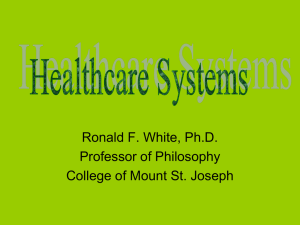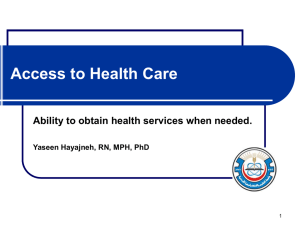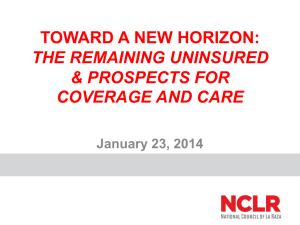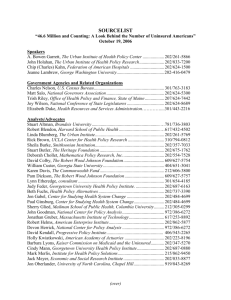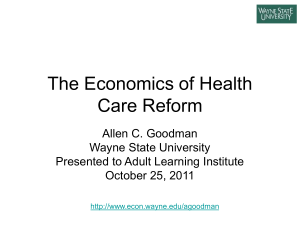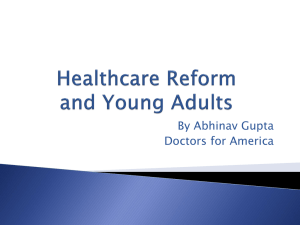Agastya-Aff Case
advertisement
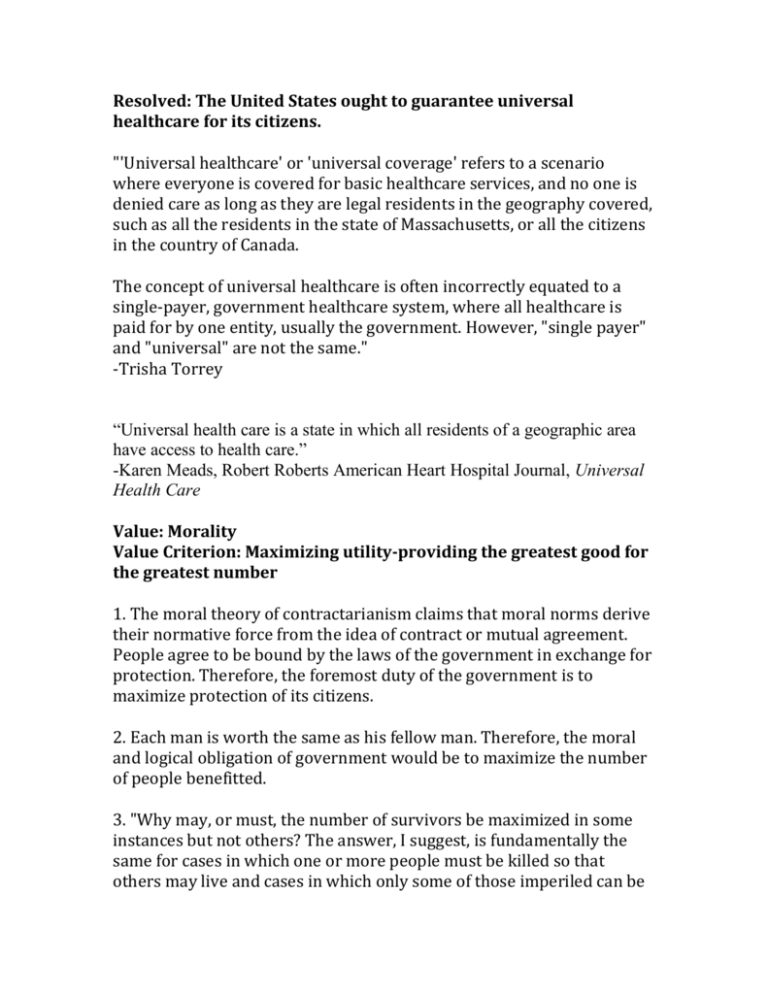
Resolved: The United States ought to guarantee universal healthcare for its citizens. "'Universal healthcare' or 'universal coverage' refers to a scenario where everyone is covered for basic healthcare services, and no one is denied care as long as they are legal residents in the geography covered, such as all the residents in the state of Massachusetts, or all the citizens in the country of Canada. The concept of universal healthcare is often incorrectly equated to a single-payer, government healthcare system, where all healthcare is paid for by one entity, usually the government. However, "single payer" and "universal" are not the same." -Trisha Torrey “Universal health care is a state in which all residents of a geographic area have access to health care.” -Karen Meads, Robert Roberts American Heart Hospital Journal, Universal Health Care Value: Morality Value Criterion: Maximizing utility-providing the greatest good for the greatest number 1. The moral theory of contractarianism claims that moral norms derive their normative force from the idea of contract or mutual agreement. People agree to be bound by the laws of the government in exchange for protection. Therefore, the foremost duty of the government is to maximize protection of its citizens. 2. Each man is worth the same as his fellow man. Therefore, the moral and logical obligation of government would be to maximize the number of people benefitted. 3. "Why may, or must, the number of survivors be maximized in some instances but not others? The answer, I suggest, is fundamentally the same for cases in which one or more people must be killed so that others may live and cases in which only some of those imperiled can be saved but none must be slain to preserve the rest, as when a rescue ship can save the passengers of only one of two capsized boats. The killing of an innocent human being ordinarily cannot be justified, in my view, by reference to some greater good that his death might accomplish. However, if somebody would reasonably have favored killing under certain circumstances - because, for example, that course would tend to maximize the number of lives saved and thus antecedently reduce her own risk of dying - then killing that person to save others is morally permissible, or even commendable." -Eric Rakowski, "Taking and Saving Lives" Thus, utilitarianism upholds the value of morality. The creation of Universal Health Care would bring about the greatest good for the greatest number. Contention 1: Universal Health Care would deal with the Inefficiencies of Privatized Health Care According to the New England Healthcare Institute: When considering examples with both strong relative strength of evidence and minimum potential annual savings of at least $1 billion, six key findings emerged, which we have listed in order of greatest financial impact: 1. Unexplained variation in the intensity of medical and surgical services, including but certainly not limited to: end of life care, overuse of coronary artery bypass surgery (CABG) and overuse of percutaneous coronary procedures (PCI), with potential avoidable costs of up to $600 billion; 2. Misuse of drugs and treatments, resulting in avoidable adverse effects of medical treatment that could save $52.2 billion; 3. Overuse of non-urgent emergency department (ED) care that could save (conservatively) $21.4 billion; 4. Underuse of generic antihypertensives, with potential savings of $3 billion; 5. Underuse of controller medicines in pediatric asthma, particularly inhaled corticosteroids, with projected savings of $2.5 billion; and 6. Overuse of antibiotics for respiratory infections, with potential savings of $1.1 billion. The root causes of each key finding were considered, yielding five systemic issues requiring further consideration: 1. Lack of compliance with clinical guidelines, raising issues of potential shortcomings in physician decision making 2. Variation in the intensity of clinical care, suggesting a lack of evidence- based decisions 3. Limited adoption of information technology in areas such as decision support and care coordination 4. Underuse of cost effective diagnostic tests; and 5. Failure of the primary care system to meet access needs. As a result of our work, NEHI is in the process of examining the following areas more extensively and developing a series of policy alternatives to decrease waste where feasible: 1. Investigating barriers to physician guideline compliance, understanding how physicians make decisions, and considering what can be done to decrease variation in evidence-based practice; 2. Examining the causes of emergency department overuse for non-urgent conditions, and the adequacy of the primary care system to offer alternatives; 3. Researching ways to improve current care practices through innovation, such as limiting antibiotic use in acute respiratory infections through point of service testing, or increasing controller medications in pediatric asthma through decision support systems; 4. Considering ways to advance the adoption of information technology to decrease medical errors, including decision support systems and e- prescribing in the outpatient setting; 5. Investigating suspected examples of waste that are not well documented, including the overuse of advanced imaging technologies and chemotherapy; 6. Examining the causes of geographic variation in clinical care; 7. Building a national coalition to identify waste and illuminating best practices to eliminate it. These changes can and will only occur under a federally controlled healthcare system. The current private institutions have no incentive to undergo such changes. "Inefficiencies persist within the healthcare system because--in contrast to other economic sectors in which competition and other economic incentives act to reduce the level of waste--none of the health care system's players have strong incentives to economize....Furthermore, because physicians advise patients on what care they need and also provide that care, they lack incentives to ration. Insurance and medical uncertainties muffle price competition and, in our litigious climate, promote overscreening and overtreatment. Health insurers, chastened by the backlash against managed care, act passively in reimbursing health care spending and, as expenditures increase, merely pass costs along to purchasers in the form of higher premiums." -Tanya G. K. Bentley, Rachel M. Effros, Kartika Palar and Emmett B. Keeler, UCLA, RAND Corporation Government has the incentive and power to introduce efficiency to prevent overeatment and overrspending from a nonprofit standpoint. A more efficient, cheaper healthcare system that can only be brought about through drastic change under federal control, will end up benefitting our whole society, saving lives. Contention 2: Universal Health Care will take many families out of poverty and save the average American much money. Subpoint A: Universal Health Care drastically reduces health care costs. "In the USA, for example, where spending on health topped $2.4 trillion in 2008, or 17% of GDP, an estimated 47 million citizens have no health coverage whatsoever, and another 25–45 million are covered by insurance that is so inadequate that major medical events may cause family bankruptcy. Studies in the USA show that at least half of all bankruptcies filed by American families in 2005 were eventuated by medical events and catastrophic health expenditures, and about a quarter of all home foreclosures filed in 2007 (before the world financial crisis) were the result of the inability to meet mortgage payments because of such costs. The USA is projected to spend $4.1 trillion by 2016, and 25% of GDP in 2025 on health." -Laurie Garrett, A Mushtaque, R Chowdhury, Ariel Pablos-Mé ndez A universal health care system would drastically reduce the tremendous costs of health care, saving poor or impoverished americans muchneeded cash. Since health is required for autonomy, providing universal health care preserves autonomy. Thereby it dramatically eases the lives of the many, low to middle income families, and slightly increases the tax burden upon the few rich families for whom the change will probably go unnoticed. Thus it brings about the greatest good for the greatest number. Subpoint B: Universal Health Care would promote Job Growth With a larger portion of the populace being covered, more medical staff will be employed to serve the populace. This can effectively heal the ailing U.S. jobs market and bring prosperity to the currently unemployed. Contention 3: Universal Health Care would remove the societal burden of the uninsured According to the American Medical Student Association, "In contrast to prevailing stereotypes, 80% of the uninsured are hardworking Americans who are employed or come from working families. However, they are unable to obtain insurance through their work either because their employer does not offer it, their employer does offer it but the employer share of the premium is too expensive, or they are not eligible for health insurance." Furthermore, it states that uninsured patients often have to face the following: "The uninsured are less likely to be able to fill prescriptions and more likely to pay much more of their money out-of-pocket for prescriptions. In a recent survey, one third of uninsured Americans reported that they were unable to fill a prescription drug in the last year because of the cost. The uninsured are 3-4 times more likely than those with insurance to report problems getting needed medical care, even for serious conditions. In one study, more than half of the uninsured postponed needed medical care due to financial concerns, while over one third went without a physician-recommended medical test or treatment due to financial concerns. The uninsured are less likely to have a regular source of health care. 40% of the uninsured do not have a regular place to go when they are sick or need medical advice, compared to less than 10% of the insured. As a result, 20% of the uninsured say their usual source of care is the emergency room, compared to just 3% of the insured. The uninsured are less likely to get needed preventive care. When compared to the insured, uninsured, non-elderly adults are 50% less likely to receive preventive care such as pap smears, mammograms, blood pressure checks, sigmoidoscopies, cholesterol screening, and prostate exams. The uninsured are more likely to be forced to delay medical services, affecting the timeline of diagnosis and thus the prognosis of the disease process. In one study, the time to diagnosis of late-stage cancer was compared between uninsured and privately insured patients. The uninsured patients were 1.7, 2.6, 1.4, and 1.5 times more likely to be diagnosed late for colorectal cancer, melanoma, breast cancer, and prostate cancer, respectively. The uninsured are more likely to receive poor care for chronic diseases. Among non-elderly adult diabetics, a lack of insurance is associated with less glucose monitoring and fewer foot and eye exams, leading to an increased risk of hospitalization and disability. Uninsured individuals with end-stage renal disease are more likely to have progressed to a more advanced stage before beginning dialysis." As a result of these difficulties accessing health care, the non-partisan Institute of Medicine estimates that the uninsured have an excess annual mortality rate of 25%. This increased mortality translates into 18,000 excess deaths for people between age 25-64 per year, which is of comparable magnitude to the number of people in this age group who die each year from diabetes, stroke, HIV, and homicide. Due to all of this, undue strain is being put on general hospitals. This slows treatment of insured patients, and the monetary burden gets passed on through further increased insurance premiums. With a universal health care system, the many formerly uninsured will finally be able to receive effective treatment earlier, lessing the societal costs of health care while simultaneously broadening the scope of our health care system, increasing qualities, saving lives. Contention 4: Universal Health Care allows for greater governmental guidance "People need to be supported more actively to make better decisions about their own health and welfare because there are widespread, systematic failures that influence the decisions individuals currently make. These failures include a lack of full information, the difficulty individuals have in considering fully the wider social costs of particular behaviours, engrained social attitudes not conducive to individuals pursuing healthy lifestyles and addictions. There are also significant inequalities related to individuals’ poor lifestyles and they tend to be related to socio-economic and sometimes ethnic differences. These failures need to be recognised. They can be tackled only [through the presence of ubiquitous health information and services]" -Derek Wanless, "Securing Good Health for the Whole Population" A Universal guarantee of Health Care would ensure that this vital information and counseling reaches all citizens. Once citizens have received guidance, they will make better choices, reducing risk, cost, morbidity, and mortality in society as a whole.

